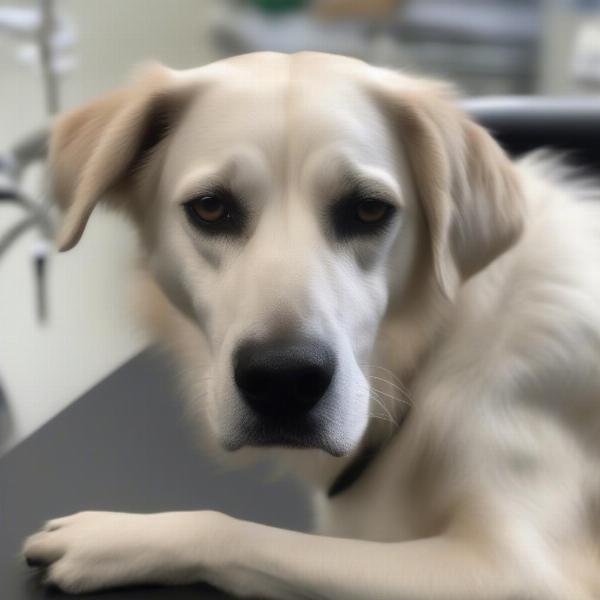Salmon poisoning disease (SPD) is a serious and potentially fatal condition that affects dogs. It’s caused by a parasite called Neorickettsia helminthoeca that infects certain types of fish, particularly salmon and trout, in the Pacific Northwest region of North America. While the name suggests home treatment, it’s crucial to understand that SPD requires immediate veterinary care. There are no effective home remedies, and attempting to treat SPD at home can be dangerous and even lead to your dog’s death. This article will explain why professional veterinary intervention is essential and what you can do to support your dog during and after treatment.
Understanding the seriousness of SPD is vital. This disease is not a simple stomach upset; it’s a complex illness that attacks your dog’s immune system. The Neorickettsia helminthoeca parasite is carried by a fluke (a type of flatworm) that infects snails. These snails are then eaten by fish, including salmon and trout. When a dog ingests raw or undercooked infected fish, the parasite enters their system, leading to a severe infection. The symptoms, which typically appear within 6-10 days of ingestion, can include vomiting, diarrhea, loss of appetite, lethargy, fever, swollen lymph nodes, and dehydration. Without prompt and proper treatment, SPD can be fatal.
 Dog Showing Symptoms of Salmon Poisoning
Dog Showing Symptoms of Salmon Poisoning
Why Home Treatment is Not Recommended
Attempting to treat salmon poisoning in dogs at home is strongly discouraged. SPD requires a specific combination of medications, including antibiotics to kill the bacteria and deworming medication to eliminate the fluke. These medications must be administered under the supervision of a veterinarian to ensure correct dosage and monitor for any adverse reactions. Home remedies may temporarily alleviate some symptoms, but they won’t address the underlying infection, which can quickly worsen and become life-threatening. Delaying proper veterinary care can significantly reduce your dog’s chances of survival.
What to Do if You Suspect Salmon Poisoning
If you live in the Pacific Northwest or have recently traveled there with your dog, and your dog exhibits symptoms of SPD after consuming fish, seek immediate veterinary attention. Be sure to inform your veterinarian about your dog’s recent fish consumption and travel history. Early diagnosis and treatment are crucial for a positive outcome.
Supporting Your Dog During and After Treatment
While home treatment isn’t a replacement for professional care, you can support your dog’s recovery during and after veterinary treatment by following your veterinarian’s instructions carefully. This may include:
- Administering prescribed medications as directed.
- Ensuring your dog stays hydrated by encouraging them to drink water or offering electrolyte solutions as recommended by your vet.
- Providing a bland, easily digestible diet to help soothe their upset stomach.
- Offering a comfortable and quiet resting place.
- Monitoring their temperature and watching for any changes in their condition.
Preventing Salmon Poisoning
The best way to prevent SPD is to avoid feeding your dog raw or undercooked fish, especially salmon and trout, from the Pacific Northwest. Thoroughly cooking fish to an internal temperature of 145°F (63°C) will kill the parasite and make it safe for your dog to eat. If you’re unsure about the source of the fish, it’s best to err on the side of caution and avoid feeding it to your dog altogether. dried fish for dogs from reputable sources can be a safe alternative.
Conclusion
Salmon poisoning is a severe threat to dogs, and prompt veterinary care is essential. There are no effective home treatments for SPD. By understanding the risks and taking preventative measures, you can protect your canine companion from this potentially fatal disease. Always prioritize professional veterinary care when dealing with any serious health concerns in your dog.
FAQ
-
Can I treat salmon poisoning in my dog with antibiotics I have at home? No, absolutely not. Using the wrong antibiotics or incorrect dosages can be harmful and ineffective. Only your veterinarian can prescribe the appropriate treatment.
-
Is salmon poisoning contagious to other dogs? No, SPD is not directly contagious from dog to dog. However, other dogs can become infected if they eat the same contaminated fish.
-
Can cats get salmon poisoning? While cats can be infected with the Neorickettsia helminthoeca parasite, they rarely develop clinical signs of SPD.
-
How long does it take for a dog to recover from salmon poisoning with treatment? With prompt and appropriate treatment, most dogs recover within a week or two.
-
What are the long-term effects of salmon poisoning in dogs? With proper treatment, there are typically no long-term effects. However, delayed or inadequate treatment can lead to serious complications or even death.
-
Are all types of fish risky for dogs? No, not all fish carry the parasite that causes SPD. However, it’s safest to avoid feeding raw fish from the Pacific Northwest region, where the parasite is prevalent.
-
Can dogs get salmon poisoning from canned salmon? Commercially canned salmon is generally safe for dogs as the canning process kills the parasite. However, always check the ingredients and avoid options with added salt or spices.
ILM Dog is a leading international online resource dedicated to providing expert advice and information on all aspects of dog care and well-being. From breed selection and puppy care to senior dog health and training tips, we offer a wealth of practical and reliable guidance to help dog owners worldwide provide the best possible care for their furry companions. Whether you’re a seasoned dog owner or just starting your journey, ILM Dog offers valuable insights into nutrition, grooming, health, behavior, and much more. We also have in-depth articles about raw chicken drumsticks for dogs, dog point wine and machine hot dog vapeur. For any inquiries or to connect with our team, please contact us at [email protected] or call +44 20-3965-8624.